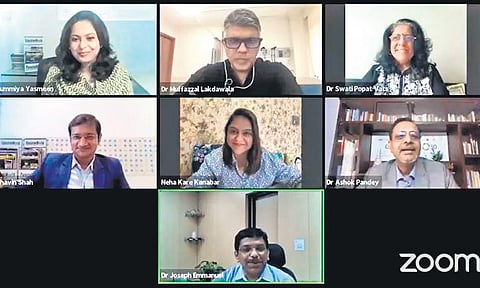

In the over last 17 months when schools stayed shut in the pandemic, students faced an almost 70-80% loss of learning, especially in mathematics and sciences. The period also saw a rise in child labour among kids from underprivileged backgrounds, who did not have to access online classes. And children with special needs suffered the most.
The above issues and more were highlighted at a recent webinar titled ‘How to Reopen Schools Safely’, organised by Shycocan Corporation. Various stakeholders in the education sector, viz teachers, principals, CBSE officials, and heads of different education bodies spoke about the pros and cons of reopening schools at the session that a large number of anxious parents attended.
The panelists included noted Surgeon Dr Muffazal Lakdawala, CBSE Director Dr Emmanuel Joseph, Dr Swati Popat Vats, President–Early Childhood Association; Dr Ashok Pandey, Director, Ahlcon group of schools; Neha Kare Kanabar, Founder, UNIMO, and CEO of Shycocan Corporation, Alok Sharma.
“By closing schools we can protect our children physically, but they have suffered psychologically. Recent studies show this has impacted them negatively, and many are suffering from anxiety and depression,” informed Dr Lakdawala.
“We need to reopen schools slowly, and use technology to protect them in areas that may not always be supervised — like playgrounds, washrooms, etc.,” he said, adding that it is unreasonable to expect smaller kids to attend online classes for long hours.
Offering suggestions on how the school reopening process can be undertaken, Dr Swati Popat Vats, President, Early Childhood Association said, “We have to take baby steps. Open schools in a phased manner, with utmost attention paid to safety inside the schools. Kids and staff members should be trained in how to take air gulps, follow sanitising procedures, and wash hands correctly, etc.” Agreeing with Dr Popat was Alok Sharma, Chief Executive Officer, Shycocan Corporation. “Much of the learning happens on playgrounds as inside classrooms, which children are now missing. But given that children are not vaccinated and can be super-spreaders, we must give them back their childhoods along with the safety and security of being able to hug a friend without having to worry about infecting someone,” he remarked.
But Dr Joseph did not agree entirely with these views, stating it is time for schools and teachers to be innovative and use informal ways to connect with students who are “on the wrong side of the digital divide” — those who cannot afford online classes and live in areas that lack digital connectivity. He went on to suggest that technological interventions like the Shycocoan Virus Attenuation Device, which the company claims can disable the entire Coronavirus family of viruses in indoor spaces with up to 99.9% efficacy, should be used to bring back students to school. “But, we must understand that right to life is most important, and learning will happen only when you are alive,” he said, adding that the CBSE has already issued guidelines to schools. “Schools must strictly follow the guidelines as well as local government norms, and not risk the lives of children,” said Dr Joseph.